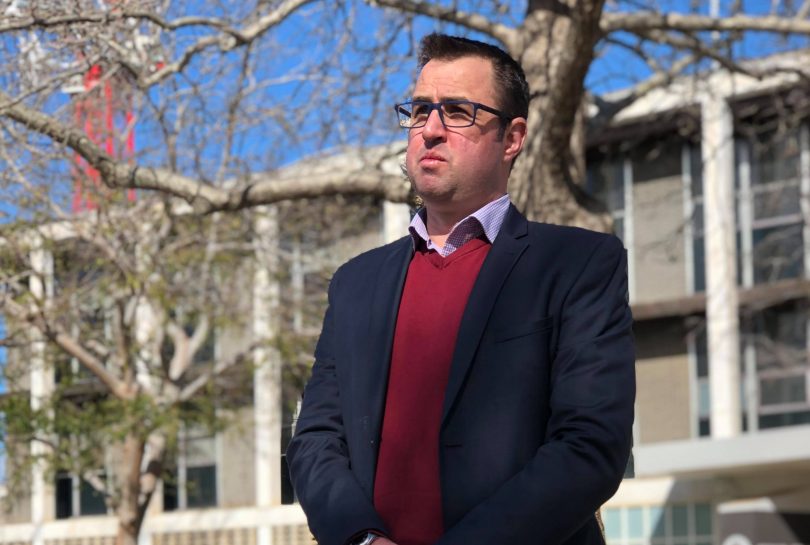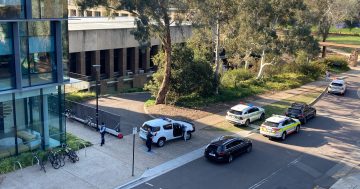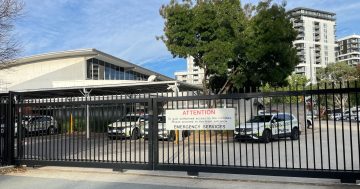
Former Australian Police Force Sergeant Jason Taylor was assaulted while on duty in January 2020. Photo: Region Media.
Former AFP officer Jason Taylor thought he’d seen it all in 14 years of duty. Working on the frontlines, he said he was exposed to someone’s worst day “seven or eight times a day”.
Then, in January 2020, he was assaulted during what should have been a routine arrest. Things quickly spiralled out of control for him and he’s since been diagnosed with PTSD and has left the police force.
Now, Mr Taylor is calling for legislative reform and better mental health support for serving and former police officers.
He’s unafraid to share his story, although he says he’s not doing it for him.
“I’m no longer a police officer, so nothing can change for me, but I can change things for my colleagues,” he said.
He also doesn’t think his mental health struggles began on that fateful day in January.
Serving on the frontline for so long, he was used to seeing murders, suicides, serious assaults and meeting victims – including children – of family violence.
So, in the months leading up to January 2020, Mr Taylor says he wasn’t coping. He recognised he was drinking more than usual, not exercising and withdrawing from those around him, including his wife and young son.

Jason Taylor is now able to spend quality time with his son. Photo: Jason Taylor.
After taking some time off, his first shift back was a stinking hot summers day. Detective Sergeant Taylor and his colleagues were called to Gungahlin after receiving reports of men fighting outside a childcare centre.
It should have been a routine arrest and one Mr Taylor and colleagues had performed countless times before. Until it wasn’t.
Mr Taylor was attacked while his back was turned. He was unable to breathe for a few moments until his colleagues stepped in and tasered the assailant.
Initially, Mr Taylor assumed this incident would be the same as the many others he’d dealt with in his career and physically, he recovered quickly.
But in the months following the attack, Mr Taylor found himself struggling more than he ever had. At one point, he tested whether a hook in his garage that usually held up a punching bag could hold his weight.
“I didn’t think I was actually considering committing suicide, but it was later explained to me that I had made a plan to do so,” Mr Taylor said.
Mr Taylor was eventually told he was suffering from PTSD and ended up self-admitting himself to the mental health unit at Calvary hospital before being moved to South Coast Private Mental Health Hospital.
He did return to work after the incident but was only able to undertake desk duties. Eventually, he left the force.
“It was a very emotional decision, but once I came to the understanding that I’d never be able to do what I wanted to do again, it was an easy one. It gave me a huge sense of relief.”
But dealing with the court process was another difficult experience. Despite having seen it up close throughout his career, he said it was the first time he’d had to experience it as a victim.
Mr Taylor’s attacker was sentenced to a 20-month intensive corrections order in March this year, which he isn’t convinced was an adequate sentence at all.
In recent months, Mr Taylor has begun to speak out more and more about his experience. He recently joined Opposition police spokesperson Jeremy Hanson to call on the ACT Government to change bail laws in the ACT to make it more difficult for people accused of assaulting frontline workers to get bail.
Things have begun to change since early 2020. When Mr Taylor was attacked, there was no offence in the ACT to specifically describe ‘assault a frontline worker’.
There is now.
Mr Taylor also thinks police officers could be better supported simply by increasing their numbers and improving working conditions.
He’s also calling for presumptive legislation to be introduced – similar to what currently operates for the military – so a police officer would not have to ‘prove’ they need mental health support.
“The system currently in place is easy enough for physical injuries but not mental health issues,” Mr Taylor explained, “especially when it’s complex trauma from multiple or ongoing incidents”.
According to Mr Taylor, the mental health needs of all frontline emergency staff must be better supported throughout and after their careers. He also noted that it’s inappropriate for police officers to be in the same mental health support facility as people they’ve had previous negative interactions as he was.
“The nature of police work means that people do break, particularly mentally,” he said.
If this story has raised any concerns for you, support is available through Lifeline 13 11 14. If you or someone you know is in immediate danger, call 000.





















